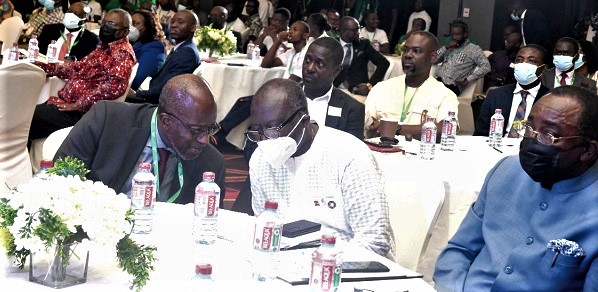
Agribusiness support initiative rolled out
An advocacy platform to help resolve the financial challenges faced by agri-businesses in the country has been rolled out. Known as the Agriculture Stakeholder Convening Platform, the initiative is aimed at de-risking agricultural financing to enable financial institutions to provide adequate credit for the agricultural and agribusiness industry.
The initiative was launched in Accra yesterday[June 29, 2022] by the Ghana Incentive-Based Risk-Sharing System for Agriculture Lending (GIRSAL) to support financial institutions to enhance their understanding of the agricultural sector, as well as its value chains, opportunities and risks.
That has become necessary following the reluctance of some banks to offer credit to agricultural industry players because they consider the sector a risky venture.
Under-served sector
The Minister of Finance, Ken Ofori-Atta, who addressed participants at the launch, said the agricultural sector was an under-served sector in terms of credit disbursement.
He said reports from the Bank of Ghana showed that the sector had received only 3.4 per cent of the total share of credit as of June 2021, a decline from 5.2 per cent in June 2020.
The minister, therefore, said GIRSAL was set up by the government to help de-risk agribusiness and encourage banks to lend to the sector.
“If agriculture is to be run as a business, then it requires finance much more than it gets now,” he added.
Seed capital
Mr Ofori-Atta said the BoG had given seed capital of GH¢200 million, in addition to GH¢10 million as operational support, while the Ministry of Finance also provided GH¢13.6 million as seed capital for the GIRSAL credit guarantee scheme.
GIRSAL, the minister further said, had also signed partnership agreements with 22 financial institutions, and that since its inception, it had issued credit guarantee to cover GH¢600 million worth of loans, which had benefited 87 agribusinesses through inputs supply, production and processing, marketing and export.
“We cannot continue to be a nation of importers. Between 2017 and 2020, we are reported to have spent as much as GH¢6.8 billion on the importation of known normal products, such as rice, tomatoes, among others.
“In the same period, the country imported about GH¢3.9 billion worth of fish and GH¢1.9 billion worth of chicken,” he said.
The minister said the government would give more attention to agriculture, especially food processing and food import substitution, by supporting commercial farming to attract educated youth to the sector.
“We must make progress in these areas in order to substantially eliminate our dependency on foreign imports. We have to conserve our foreign exchange resource, increase food security and create good jobs,” Mr Ofori-Atta said.
He commended the MoFA and the BoG for their cooperation and foresight in the establishment of GIRSAL.
Concerns
The Minister of Food and Agriculture, Dr Owusu Afriyie Akoto, expressed worry over the failure of some banks to finance agriculture, especially poultry farmers, a situation he said was affecting the poultry industry.
He said over the past five years, the government had invested GH¢2.6 billion to subsidise seeds and fertiliser for farmers as a way of increasing productivity.
The Chief Executive Officer of GIRSAL, Kwesi Korboe, said the platform would consist of multi-stakeholder groups to initiate and deepen discussions on pertinent issues affecting effectiveness and efficiency in the agricultural sector.
It would also highlight opportunities and recommend solutions to challenges in the sector, he added.
For her part, the Deputy Governor of the BoG, Dr Elsie Addo Awadzi, said since banks were in business, they determined who to lend to.
“It is very important that as we promote agricultural lending, we also understand the constraints to financing and how we can address them,” she said.
